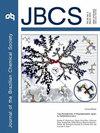Tucumã (Astrocaryum aculeatum)纸浆水提物介导纳米银的制备
IF 1.3
4区 化学
Q3 CHEMISTRY, MULTIDISCIPLINARY
引用次数: 0
摘要
Tucumã (Astrocaryum aculeatum)纸浆中含有大量次级代谢物,这些代谢物可以介导金属纳米颗粒的合成,比传统的合成途径更环保、更可持续。本研究考察了tucumã纸浆水提取物介导的银纳米颗粒(AgNPs)的生产,并对不同的参数,如温度、提取物浓度和反应介质的pH值进行了评估。碱性反应介质在400 nm左右产生了最强烈和清晰的电子谱带,表明在三种浓度tucumã纸浆中AgNPs的形成。根据动态光散射(DLS)和透射电子显微镜(TEM)数据,反应介质温度的升高也增强了AgNPs的表面等离子体共振带,但增加了制备的纳米颗粒的多分散性。Zeta电位结果表明AgNPs的稳定性中等(接近-30 mV)。胶体金属颗粒的抑菌性评价表明其对革兰氏阴性大肠杆菌具有杀微生物活性。本文章由计算机程序翻译,如有差异,请以英文原文为准。
Production of Silver Nanoparticles Mediated by Aqueous Extracts of Tucumã (Astrocaryum aculeatum) Pulp
Tucumã (Astrocaryum aculeatum) pulp presents a large number of secondary metabolites that can mediate the synthesis of metallic nanoparticles through a greener and more sustainable synthetic route than traditional ones. This study investigated the production of silver nanoparticles (AgNPs) mediated by aqueous extracts of tucumã pulp assessing different parameters, such as temperature, concentration of extract, and pH values of the reaction media. The alkaline reaction media produced the most intense and well-defined bands around 400 nm in the electronic spectra, indicating the formation of AgNPs in the three concentrations of tucumã pulp evaluated. The increase in the temperature of the reaction media also enhanced the surface plasmon resonance band of AgNPs but it increased the polydispersivity of produced nanoparticles according to the dynamic light scattering (DLS) and transmission electron microscopy (TEM) data. Zeta potential results indicated moderate stability of the AgNPs (close to -30 mV). Antimicrobial assessment of the colloidal metal particles indicated microbicide activity against the Gram-negative Escherichia coli bacterium.
求助全文
通过发布文献求助,成功后即可免费获取论文全文。
去求助
来源期刊
CiteScore
2.90
自引率
7.10%
发文量
99
审稿时长
3.4 months
期刊介绍:
The Journal of the Brazilian Chemical Society embraces all aspects of chemistry except education, philosophy and history of chemistry. It is a medium for reporting selected original and significant contributions to new chemical knowledge.

 求助内容:
求助内容: 应助结果提醒方式:
应助结果提醒方式:


